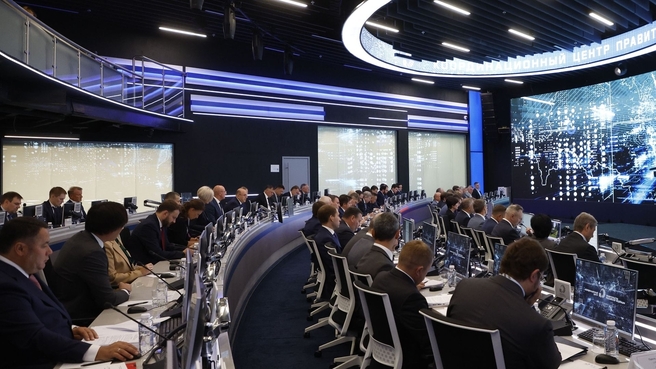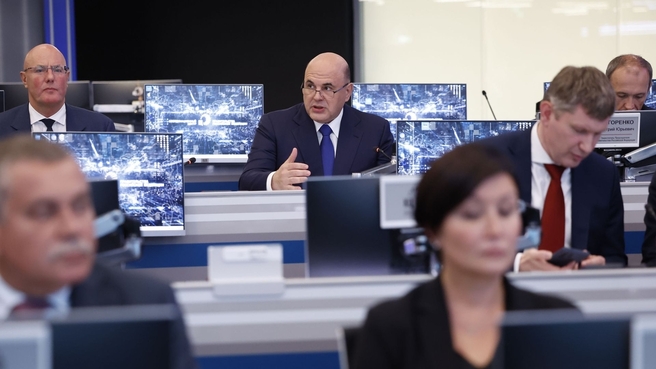Mikhail Mishustin: “The tourism sector should accomplish a number of key objectives. To accomplish them, it is necessary to chart clear and understandable actions that will facilitate its dynamic development, and that will give impetus to such important spheres as transportation, industry and trade, to name a few. This means that we will create additional jobs, attract extra investment, and, most importantly, strengthen the economy of Russian regions.”
Mikhail Mishustin’s opening remarks:
Good afternoon, colleagues.
We are continuing our strategic sessions. Tourism, the tourism industry is on the agenda today.
Quite recently, Altai hosted a major conference where we analysed the situation in this sphere in great detail and set out a number of objectives that should be accomplished in the next few years.
What is important today? It is necessary to work out the necessary solutions in great detail, all the more so as expanding inbound tourism facilitates the development of this sector, as well as affiliated sectors. We are actively creating a transport infrastructure nowadays. We are building resorts and hotels, opening restaurants, new cafes and transforming cityscapes.
More and more Russian regions are attracting travellers. The number of tourists continues to increase each year, and not just during the summer vacations and winter holidays.
We are creating more comfortable conditions for beach leisure and wellness, and we are providing recreation opportunities. There are many interesting and diverse leisure opportunities, including small guided tours and cruises, as well as long-duration trips to remote areas of this country with its unique nature.
Given rising demand, it is necessary to facilitate the comprehensive development of the entire tourism sector and to elevate the quality of tourism services to a higher level.
It is especially necessary to upgrade the hotel sector and to provide accommodation meeting the diverse requirements of travellers.
Today, Russia has over 30,000 comfortable, modern hotels, spa retreats and recreational facilities. All told, this amounts to more than one million rooms, and their number is growing.
These results were made possible by the effort to raise private investment, active business involvement, and, of course, thanks to the Government’s aid to companies under the Tourism and Hospitality Industry national project. Over the past two years, we have allocated over 100 billion roubles for its implementation. We see that by and large the industry is developing and tourism infrastructure is being upgraded.
This work has to be continued, including the programme to build modular hotels. As you know, the President has instructed us to increase its financing by 11 billion roubles over the next two years.
Moreover, there is yet another set of measures to promote tourism in this country. I am referring to the Small and Medium-Sized Business Enterprise and Support for Individual Entrepreneurial Initiative national project, special economic zones, and agreements on protection and encouragement of investment.
Our next priority is to increase transport availability and production of means of transportation for tourists.
Today, a great number of our citizens are headed for holiday destinations by car. In the majority of cases, these are rather short weekend tours of neighbouring regions, where you can spend your free time in an interesting and enlightening way, often in the company of family members or friends. Last year, these tours accounted for nearly one-third of all tourist travel. But there are also individuals, who take long-distance drives.
The essential thing in this regard is to expand the network of roadside service plazas that make travelling by car comfortable. There is a successful record in this regard in the Republic of Bashkortostan, where a strategy was devised and implemented. We discussed this strategy in detail at our last meeting. I would recommend everyone to look into this practice – colleagues will deliver reports today – so that it could be applied in other regions of Russia.
We still have a lot to do to create tourist attractions in various regions.
To launch major investment projects in the tourism industry, the President instructed the Government to prepare solutions to help businesses build year-round amusement parks, water parks, and develop ski resort infrastructure.
In this regard, it is important to thoroughly address the various aspects of making amusement facilities and equipment domestically, such as ropeways and chairlifts. We need to determine which facilities, machines and equipment the tourism industry needs, and how much, to replace everything that used to be imported.
At the same time, we need to assess the capabilities of our industry in order to understand what we should produce, in what quantities, and where it is going to be used. There are no problems with demand. It will only grow.
And of course, there is the personnel issue.
The fast-growing hospitality industry in Russia requires more and more trained professionals. It is obvious that they literally need to be taken right out of school. This means that new higher and secondary education programmes need to be developed, and the regional authorities and representatives of the tourism business need to be involved, including under the Professionalism project. Young people must be involved in hands-on training during their studies, right from the first years. These programs must use a practice-oriented approach. We discussed these and other measures in detail with representatives of the hotel business a month ago. Today I expect to hear specific proposals on all the subjects I have mentioned.
We will also discuss inbound tourism, introduction of IT solutions, and the funding for our measures to improve the hospitality industry.
Colleagues, the tourism sector has a number of major goals. To achieve them, we need to work out clear and understandable measures that will contribute to its dynamic development and spur on other important sectors such as transport, industry, trade, and many others. Everyone knows that tourism has the highest multiplier effect – this means it will encourage growth across the economy including new jobs and additional investment, and most importantly, it will strengthen the economy of Russian regions.










